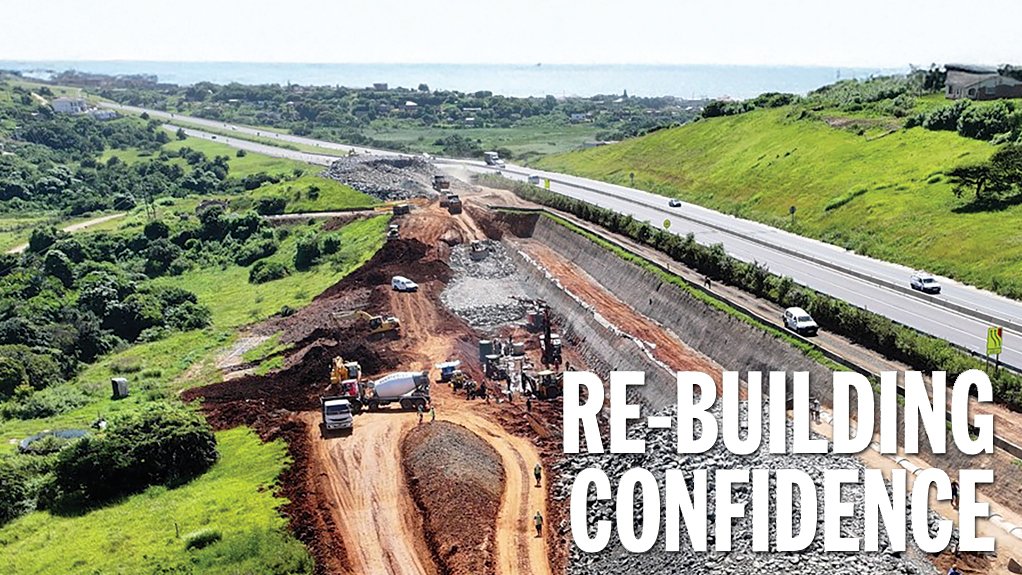Procurement proficiency and project execution key to reigniting construction
The continued progress of structural reforms in South Africa – including at State-owned enterprises (SOEs) such as Transnet – is contributing to improved investor sentiment and growth in the construction sector.
But for all the progress, the sector continues to be constrained by a litany of entrenched problems, chief among them overstretched government finances, late payment of contractors, project cancellations and underspending of budget allocations.
Experts in the built environment also cite the operational effects of lacking infrastructure and service delivery capacity at local government level and extreme weather as factors weighing down performance, while cost volatility – despite easing inflation this year – remains concerning.
The foremost factor inhibiting increased construction activity though is sluggish economic growth. It has become essential for companies to identify opportunities “outside of the status quo”, including at provincial and local government level and, often, in coastal regions or neighbouring countries, says Afrimat CEO Andries van Heerden.
While government announcements on infrastructure development appear exciting, the corresponding orders are not yet visible. Moreover, delays in the adjudication of contracts and difficulty in dealing with government results in skills migration and relocation outside the country, he adds.
Underspending is among the most pressing concerns, stalling high-impact effects on economic growth and jobs, says Construction Industry Development Board (CIDB) board member Sibusiso Makhanya.
He believes more systematic action by government is needed, including better monitoring frameworks, the employment of skilled procurement officials, prompt payment to contractors and stronger accountability mechanisms for government infrastructure spend.
In 2023/24, overall municipal capital expenditure amounted to R61-billion, with 77% of the budget spent, leaving R18-billion unspent. District municipalities spent 83% of their budgets during the year, while metros spent 78%. Only four of the 11 municipalities in Gauteng exceeded 80% of their budget allocations.
SOEs account for 30% of the national infrastructure budget, but typically spend only 89% of the allocated amount, leaving R10-billion out of R85-billion unspent in 2023/24.
“Every R1-million not spent in government expenditure leads to lost output of R3-million across the economy,” Makhanya notes.
He questions whether financial teams within municipalities, which are often left with procurement decisions, are sufficiently versed in project technicalities.
Makhanya believes that it is the collective responsibility of all stakeholders to hand the construction industry over to the next generation in a better state. This includes “educating each other” on the challenges and opportunities in the sector.
Deeper Issues
For consultancy Industry Insight founder and CEO Elsie Snyman, a notable issue is political instability in local governments, with a high turnaround of mayors in Gauteng’s metros, for example, leading to a lack of accountability and negative impacts on capital budgets.
Tshwane has had four mayors over the past five years, each serving no more than 18 months at a time, while Johannesburg has had seven and Ekurhuleni four during the same period.
Snyman is concerned about declining capital spend in metros as a percentage of the total budget.
Ekurhuleni’s capital spend as a percentage of the total budget has decreased from 14% in 2016/17 to less than 5% in 2025/26, while Tshwane’s has declined from 18% in 2012/13 to 4.5% in 2025/26 and Johannesburg’s from 20% in 2014/15 to 9.7% in 2025/26.
Conversely, Cape Town, which has had only one mayor over the past five years, has managed to maintain capital spend at 15% in 2025/26, compared with 19% in 2012/13.
In terms of tender activity, Gauteng’s tender offers have decreased (in volume) by nearly 70% since 2004, from the more than 700 released every year to fewer than 300.
Snyman says profitability in the construction industry is under immense strain nationally, with an average margin of only 1.4% in the first quarter of the year, compared with 5.2% in 2023 and 2.4% in 2024. This smaller profit margin leaves less room for error, thereby making cash flow and timely payments imperative.
Government has about R112-billion in outstanding payments overdue by 90 days or more, with Gauteng having R22.5-billion of outstanding payments, she adds.
At national level, 84% of payments to creditors are outstanding, while 74% of Gauteng’s creditor payments remain unpaid. This compares to 43% of creditor in the Western Cape and a staggering 94% in the Free State, Mpumalanga and the Northern Cape.
Commenting on the challenge of nonpayment, CIDB CEO Bongani Dladla says the organisation is waiting for approval to proceed with the creation of an ombudsman to help resolve payment disputes in the industry. He explains that litigation is often too costly and time-consuming for contractors, underscoring the need for an ombud’s office with built-environment professionals who understand the value of timely payments and the cost of tender cancellations.
For Dladla, more investment in infrastructure is required, including through public–private partnerships. He also underscores the need for government underspending to be addressed with equal urgency. Further, he proposes the implementation of a blockchain-based system that measures the performance of every stakeholder involved in a project, including timely payments and the quality of the work delivered.
Dladla and Snyman agree that procurement committees must have more competent personnel with technical expertise, who can be held accountable for performance failures.
“Often, it is accounting officials [who] make procurement decisions, which is not their area of expertise. Some metros are also reluctant to garner assistance, which further contributes to project cancellations,” Dladla states.
Moreover, Snyman says project postponements and cancellations, particularly after a flurry of tenders around election time, are occurring at an increasingly alarming rate. In the year to date, the average cancellation rate is 24% in Gauteng, 7% in the Western Cape, 33% in KwaZulu-Natal and 22% across the country. Nationally, about 173 public- sector projects were cancelled between January 1 and May 31, which she describes as “a significant amount”.
Private-sector demand for public infrastructure projects (manifesting in the value of plans approved) has slowed to a three-decade low of R28-billion in Gauteng, having decreased by 10% year-on-year over the past 12 months. The Western Cape is the main driver of private-sector investment demand in public infrastructure projects, with R33-billion worth of plans having been approved over the past 12 months.
Snyman says Gauteng’s public infrastructure project pipeline has, ultimately, decreased to R43-billion as of March, marking a 3% year-on-year decline. Project pipelines in KwaZulu-Natal and Limpopo have also decreased year-on-year – by 31% to R31-billion and 43% to R9.4-billion respectively as of March.
Industry Response
To manage some of these industry challenges, construction and materials company Raubex has focused on strengthening contract structuring, embedding milestone- based payment terms and improving project risk management.
These measures help the group to manage uncertainty, protect delivery timelines and keep teams productive on the ground.
“While the sector remains under pressure in parts, we are seeing some proactive planning and stronger discipline on execution,” Raubex CEO Felicia Msiza tells Engineering News & Mining Weekly.
She is encouraged by the strong pipeline of projects in roads, renewable energy, and water and sanitation in the country, with more projects in these sectors progressing to implementation.
“Infrastructure rollout creates continuity for contractors, sustains jobs and gives suppliers and small and medium-sized enterprises (SMEs) space to participate. It also reinforces confidence across the sector and encourages reinvestment in long-term delivery capacity.”
Like many other industry giants, Raubex believes that greater private-sector participation is key to closing delivery gaps. However, this will require clarity in procurement processes, well-structured delivery models and confidence in long-term execution and payment mechanisms.
“Where public–private partnerships are effectively managed, the results tend to be impactful and sustainable,” Msiza asserts.
For Afrimat construction materials COO Davin Giles, the key to the company’s resilience in a muted built environment scenario has been to diversify its supply across geographies and ensure that its quarries operate efficiently to remain competitive.
He hopes to see more collaboration between government and the private sector to unlock more potential but acknowledges that this will require trust and working towards a common goal.
Scaling Excellence
While many SMEs face challenges regarding working capital, bonding requirements and complex accreditation processes, companies such as Raubex have embedded enterprise development into their delivery models, including structured joint ventures (JVs), mentorship frameworks and fast-tracked payments to qualifying subcontractors.
“These types of partnerships help build experience and improve access, but there is still room for wider systemic support,” Raubex states.
The company believes that there are broader industry gains to be achieved through the use of technology, with some of the benefits it notes including improved project control systems, real-time reporting and tools that strengthen coordination across teams.
Msiza says these systems have helped to reduce the need for rework, accelerate decision-making and improve planning accuracy on complex projects.
Raubex also recognises that the future sustainability of construction in South Africa depends on talent pipeline development through apprenticeships, graduate programmes and skills development initiatives.
For Afrimat, industry sustainability depends on more SMEs being assisted by larger firms in JV-type arrangements to access opportunities and learn about the industry. The company also believes that government can assist more by paying SMEs and contractors on time and enabling the growth of such SMEs, including by fostering entrepreneurship.
“Our hope for South Africa and the Government of National Unity is to promote job creation through infrastructure spending. This should focus on areas that will generate the most significant impact, ensuring [that] funds are not wasted on a select few and making sure that skills gained from infrastructure investment have a lasting effect on the economy,” Afrimat concludes.
Article Enquiry
Email Article
Save Article
Feedback
To advertise email advertising@creamermedia.co.za or click here
Press Office
Announcements
What's On
Subscribe to improve your user experience...
Option 1 (equivalent of R125 a month):
Receive a weekly copy of Creamer Media's Engineering News & Mining Weekly magazine
(print copy for those in South Africa and e-magazine for those outside of South Africa)
Receive daily email newsletters
Access to full search results
Access archive of magazine back copies
Access to Projects in Progress
Access to ONE Research Report of your choice in PDF format
Option 2 (equivalent of R375 a month):
All benefits from Option 1
PLUS
Access to Creamer Media's Research Channel Africa for ALL Research Reports, in PDF format, on various industrial and mining sectors
including Electricity; Water; Energy Transition; Hydrogen; Roads, Rail and Ports; Coal; Gold; Platinum; Battery Metals; etc.
Already a subscriber?
Forgotten your password?
Receive weekly copy of Creamer Media's Engineering News & Mining Weekly magazine (print copy for those in South Africa and e-magazine for those outside of South Africa)
➕
Recieve daily email newsletters
➕
Access to full search results
➕
Access archive of magazine back copies
➕
Access to Projects in Progress
➕
Access to ONE Research Report of your choice in PDF format
RESEARCH CHANNEL AFRICA
R4500 (equivalent of R375 a month)
SUBSCRIBEAll benefits from Option 1
➕
Access to Creamer Media's Research Channel Africa for ALL Research Reports on various industrial and mining sectors, in PDF format, including on:
Electricity
➕
Water
➕
Energy Transition
➕
Hydrogen
➕
Roads, Rail and Ports
➕
Coal
➕
Gold
➕
Platinum
➕
Battery Metals
➕
etc.
Receive all benefits from Option 1 or Option 2 delivered to numerous people at your company
➕
Multiple User names and Passwords for simultaneous log-ins
➕
Intranet integration access to all in your organisation





















